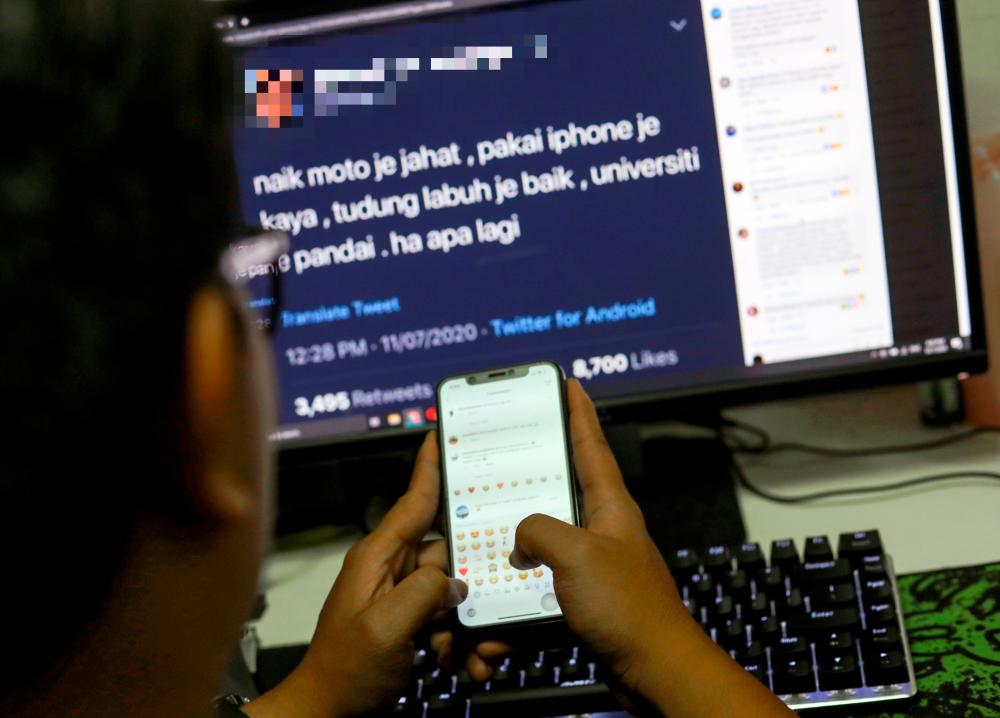PETALING JAYA: Rapid growth in internet coverage and high usage of social media platforms have led to a spike in cyberbullying cases in the country.
In 2020, Malaysia ranked second in Asia for cyberbullying among youths, according to a recent United Nations Children’s Fund report.
This is reflected in the number of reported cyberbullying cases. The Malaysian Communications and Multimedia Commission (MCMC) received 6,598 public complaints related to online harassment from 2020 to July 2021.
“Access to mobile phones and computers also increased to 98.6% and 77.6% respectively in 2020. The most popular internet activity was participation in social networks,” criminologist Shankar Durairaja told theSun.
“Cyberbullying can hurt victims psychologically, emotionally, socially, physically, and finally, damage their behaviour and attitude.
“According to the Cyber Bullying Research Centre, most of the high-profile suicide cases are due to cyberbullying. Similar to traditional bullying, cyberbullying contributes to deadly long-term effects on victims.”
He pointed out that malicious content on the internet with the intent to annoy, provoke, abuse, threaten or harass another person is an offence under the Computer Crimes Act 1997, Communication and Multimedia Act 1998, Penal Code and the Child Act 2001, depending on the nature or severity of the case.
“According to the Communication and Multimedia Act 1998, under Section 233(1), it is an offence to create or solicit comments or other forms of communication that is obscene, indecent, false, menacing or offensive to annoy, abuse, threaten or harass another person. A convicted person is liable to a fine of up to RM50,000 or a maximum prison term of one year,” he added.
Shankar noted that the erosion of moral values in society due to the impact of technologies and lack of legal attention towards cyberbullying are also reasons it is increasingly rampant.
He suggested that the government look into educating citizens, especially youngsters, about the safe and ethical use of information and communication technologies to maximise the benefits and minimise harm and risks, including social and legal consequences of engaging in harmful uses of it.
Furthermore, he noted that our existing laws are not enough and complicated due to many different ministries involved.
“We need to have a standalone Anti-Cyberbullying Act that focuses on the definition of the offence, types of offences, the victims’ rights, punishments for the offenders, complaint mechanisms, roles and responsibilities of the social media and internet service providers, and treatment and rehabilitation for the offenders,” he said.
“The Communications and Multimedia Ministry is currently preparing a Cabinet paper on anti-cyberbullying laws. The government needs to promote digital responsibility among our citizens. How? Include online safety within the school’s curriculum, which can be a prevention strategy to address cyberbullying in schools.”
Nethics project vice-director, Balqis Mohamed Ismail said the 6,598 complaints lodged with MCMC is an alarming number in a span of less than a year.
Nethics, a campaign organised by final year communication students of Universiti Sains Malaysia, was formed to create awareness and instil proper social media etiquette by focusing on netiquette, cyber harassment and personal branding among youths.
According to Balqis, cyberbullying is prominent in Malaysia because people view it differently from the traditional definition of bullying.
“They’re both bad and have terrible consequences. More people need to realise this. At the same time, we may be spending too much time on the internet. Hence, the endless squabbles online which may lead to cyberbullying,” she said.
“The most important thing is that many youths are not aware that cyberbullying is a crime, and this perception needs to change.”
People having more access to mobile phones and computers are among factors contributing to the increase in cyberbullying cases.










